It’s About The People
The essential role of human touch in the access experience
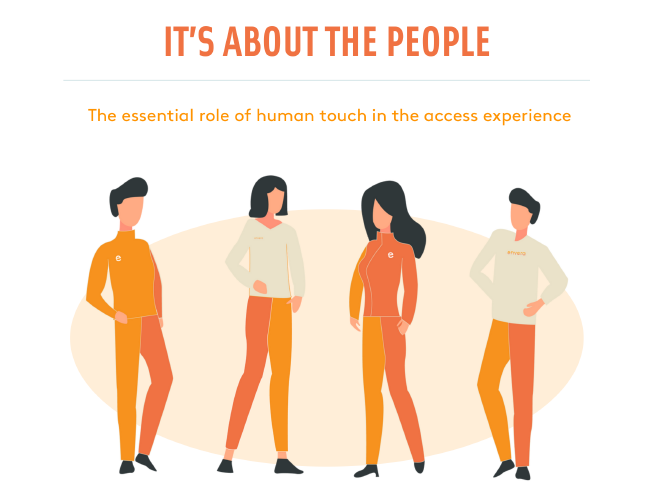
Abstract
The healthcare industry, despite being the fifth largest in the U.S., falls behind in terms of simplicity of experience, ranking last at 25th place. The presence of long wait times, complex paperwork, convoluted language, and confusing insurance plans has created a significant disparity between the consumer-oriented experience that modern patients desire and the outdated system they often encounter.
Today's healthcare consumers have higher expectations. Studies indicate that they anticipate the same level of personalized and convenient experiences from their healthcare providers as they receive in other areas of their lives, such as retail. This explains why companies like Amazon, Google, and Apple are venturing into the healthcare space, introducing significant competition for traditional health systems.
To position themselves for success, healthcare providers must leverage their longstanding ability to manage intimate patient relationships. While retailers may have an advantage in terms of convenience through modern engagement tools, providers have long recognized the importance of establishing authentic patient connections, given the personal nature of healthcare management.
Despite the expanding role of technology in healthcare delivery, the personal touch provided by well-trained, responsive, and empathetic human beings will continue to be crucial for ensuring patient satisfaction.
While industry disruptors offer healthcare consumers more technological and AI-driven solutions, established providers can foster loyalty by consistently building trust through the human connection that defines care culture. Every step of the patient journey is significant, starting with the initial experience at the first point of contact. Patients seeking care often feel vulnerable, anxious, and in need. Therefore, having individuals with the appropriate skills and a positive mindset handle these initial interactions becomes the foundation for establishing positive and enduring patient relationships. Selecting the right person for this challenging role is of utmost importance.
By fostering patient connections that inspire lifelong provider relationships, healthcare organizations can ensure a patient-centric approach that goes beyond transactional interactions. In this paper, we will explore the impact of human touch in patient interactions, identify the qualities that make a person well-suited for the demands of care culture, and provide insights on maintaining a culture in your access center that promotes empathy.
Part One: The Critical First Step
Patient access is a pivotal first step in the patient journey; seeking care is often difficult as many patients experience anxiety or stress over health issues and the potential costs incurred to treat them. The first interaction with the provider’s office, when a patient calls to schedule an appointment, can set the tone for the patient care experience that follows. For new patients, this single interaction can have a lasting first impression. This is why it’s critical to have an access experience that is simple and convenient— clunky scheduling and patient onboarding processes can compound a patient’s distress.

Studies indicate that the single most impactful part of the patient experience when it comes to loyalty and retention is “effort.” “Effort” is more than just “ease of use,” it is the amount of energy a patient must expend to get treatment; many metrics used to rate patient satisfaction can be traced back to this aspect of their experience. A poor access experience with confusing phone trees, long wait or hold times, or multiple transfers add to the perceived effort required to get service. Additionally, care taken during the registration and scheduling process reverberates through every additional step of the patient journey, from attention to requests at the time of service to the ease with which insurance and billing are processed afterward.
88% of healthcare appointments are scheduled by phone. In fact, patients spend more time on the phone with their provider’s office than they do receiving care. The average practice takes 3.5 calls per scheduled appointment, from symptom questions to appointment scheduling and follow-up. The average patient call, regardless of practice type, lasts 6 minutes, while the average time a patient spends with their physician is just under 16 minutes…
This means patients spend about 40% more time on the phone than with physicians.
This illustrates the immense influence that access has on the patient experience. Phone interactions sandwich care experiences, as the beginning and end of the patient journey, giving them the power to not only set the tone for the onsite experience but offset any negative feelings from them. In surveys, the words most used to describe a bad patient experience are “rushed,” “rude,” “wait,” and “dismissive.” Furthermore, after a single negative customer service experience 75% of patients will delay care and as many as 65% would discontinue services with their provider altogether.
62% of patients say that their interaction with administrative staff is critical to a positive experience.
Considering all of these factors, your access center staff have a huge responsibility to not only extend the values of care culture but to perform all of the functions of an access coordinator in the narrow space between efficiency and courtesy.
Part Two: The Importance of Care Culture
As we have illustrated, your healthcare call center has a more important role than simply fielding patient calls. There is a critical responsibility to manage patient sentiment which when executed successfully can enhance your reputation, grow your brand, and most importantly, ensure the best patient outcomes. To do so the healthcare call center must be motivated by the same values of care culture essential to the industry as a whole.
3 Key Aspects of Care Culture
Access
The desire to give patients access to services and treatments is foundational to care culture. An easy fit for the healthcare call center, promoting access starts with the important job of finding and connecting patients with the right care provider to schedule an appointment. An effective healthcare call center understands the critical role this plays in patient outcomes, motivating them to enable this connection with a positive first impression and minimal inconvenience.
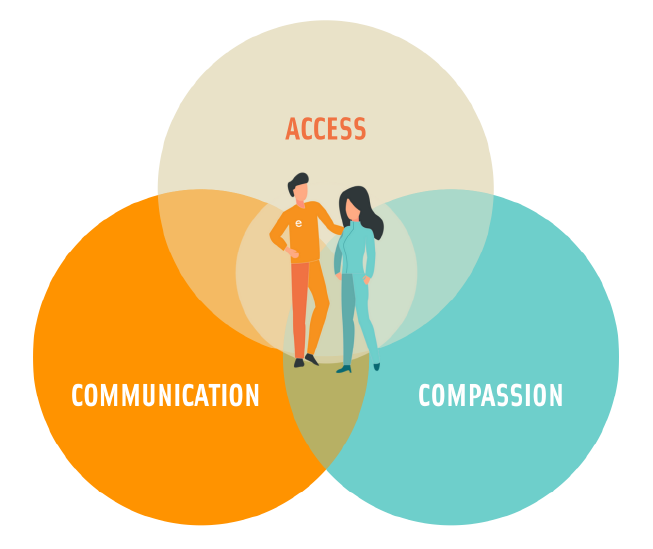
Communication
Effective and compassionate communication is at the center of all healthcare services. The ability to convey important messages about a patient’s health is essential to care delivery. When communication channels are strong and open, it engenders patients to their providers and builds trust. A healthcare call center should strive to strengthen these connections and assist providers in improving patient outcomes through meaningful patient relationships that engender engagement.
Compassion
Compassion is at the heart of care culture and a key component in ensuring a superior patient experience, whether in-person or on the phone. It’s essential to demonstrate to patients that the provider cares about their needs. In order to do so, you must meet more than patients’ physical needs, but emotional ones as well. A healthcare call center should recognize its ability to make a difference in the lives of patients by taking the time to listen, explain, and address a patient’s concerns can help ease the patient’s mind and let him or her know they are being heard.

Empathy, in healthcare, means putting yourself in the shoes of the patient. Compassion goes a step further to take action to help. Both are essential skills for providers, that have been shown to been shown to build trust, generate loyalty, increase satisfaction, and even improve clinical outcomes.
Empathy’s Impact on Clinical Outcomes
Separate studies conducted by the Annals of Family Medicine and the Patient Education Counsel found that a patient’s symptoms waned and their condition resolved at a faster rate when their provider exhibited high levels of empathy. While neither identified the expression of empathy itself as the cause, both suggested that providers who display high levels of empathy may be better at care delivery due to their ability to truly listen to patients' needs and involve patients in decision-making about their care.
It should be no surprise these have been identified as crucial to a positive patient experience. Empathy is essential to providing good customer service. Though these are often thought of as interpersonal skills, something that can only be demonstrated in person, they are just as, if not more so, important over the phone. Similar to physicians, empathetic representatives are better able to understand patient needs and provide solutions. They're also better at navigating difficult or potential emergencies because they can see multiple perspectives.

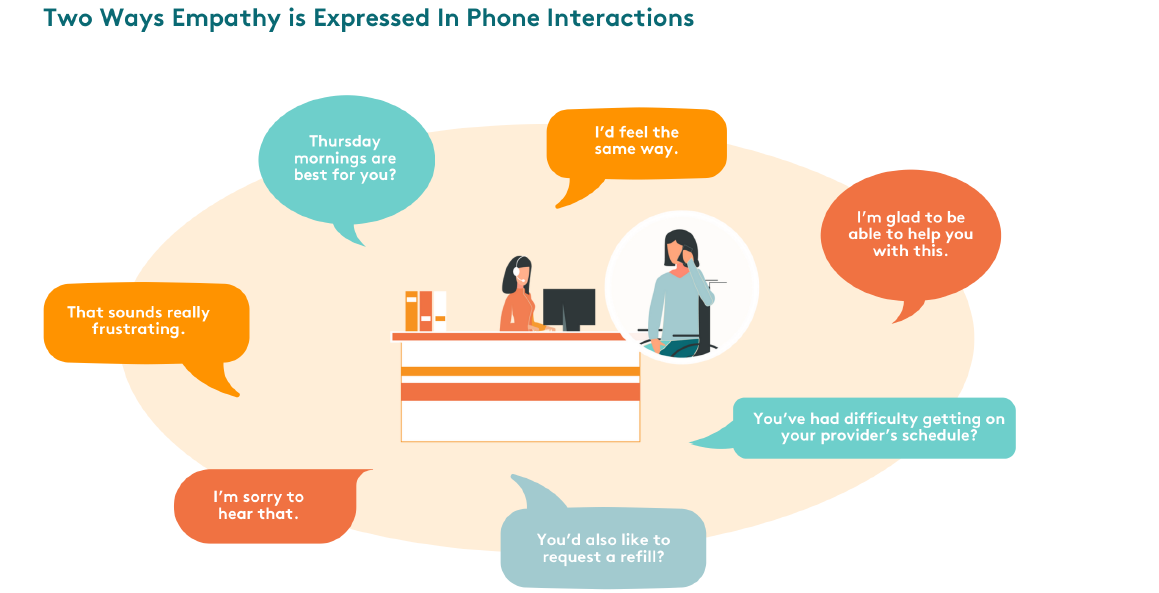
Active Listening
This means repeating back what the patient has said, to ensure you understand their concerns. “You’ve had difficulty getting on your provider’s schedule?”
Empathy Statements
These are phrases that show you understand how the patient is feeling. "That sounds really frustrating.”
Using active listening and empathy statements convey empathy despite not being face-to-face with the patient. When patients feel heard and understood, they're more likely to have a positive experience with their provider and be loyal to your organization. In fact, one study of call center interactions found this was the strongest predictor of patient loyalty.
Part Three: The Right People for the Job
With so much resting on the access experience, choosing the right people for this job is critically important. Learning to balance efficiency with courtesy can be taught through effective training, the interpersonal skills needed to extend the values of care culture over the phone, however, can be more a matter of personality and attitude. Having hired and trained thousands of agents, we analyzed internal data to reveal the personality traits and values of individuals that excel in this role.
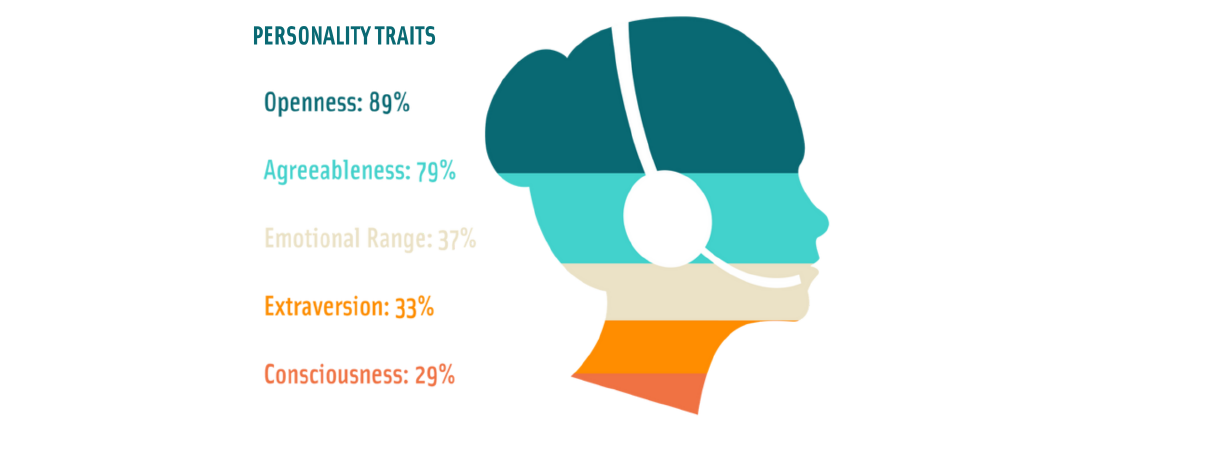
Of these traits, the ones we have found to be most impactful are Openness and Agreeableness. Openness to experience is highly correlated with intelligence and creativity. Access representatives must be agile when listening to patients in case they either aren’t aware or forthcoming about a potential health emergency. Additionally, creative problem-solving is important to not only the logistical demands of the role but in phone interactions that lack visual cues.
Openness defines a natural inclination towards curiosity and open-mindedness. To create a positive and relationship-building patient experience, agents must genuinely want to learn about the person on the other end of the phone. And, in a healthcare setting where patients are often sharing sensitive personal information, this must be received without judgment. People with open personalities naturally put patients at ease, resulting in better communication about the patient’s needs— which then allows the agent to best serve them.
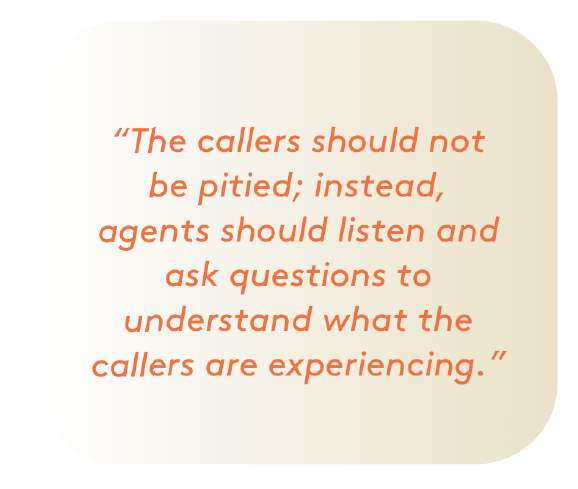
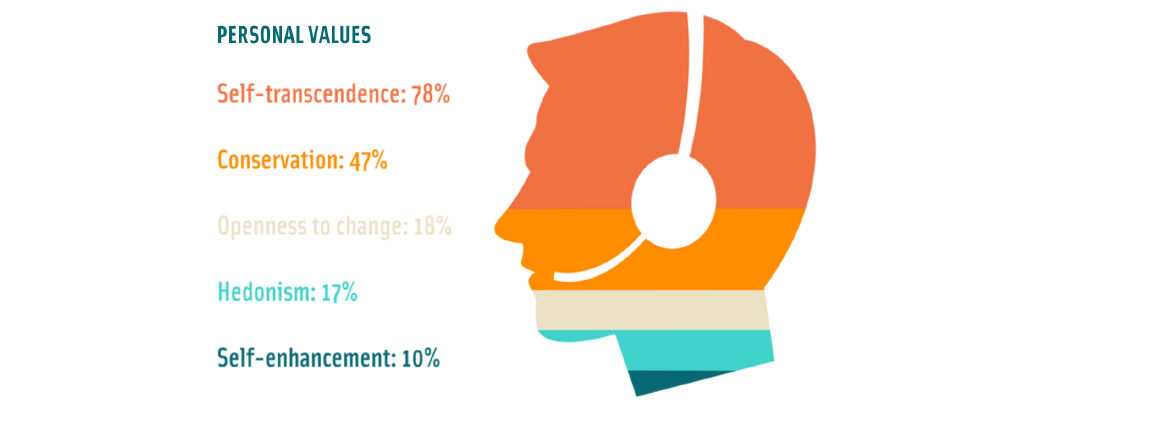
Self-Transcendence
A key marker of people in healthcare is self-transcendence. This not only trait indicates an “in-service-to-others” mindset but includes characteristics such as altruism and compassion. The self-transcendent person is highly focused on the needs of others. They are keenly focused on doing what’s “right” and intrinsically motivated— in healthcare, this means they find the work they do helping patients personally rewarding. A variety of studies have been conducted regarding the role of self-transcendence in healthcare settings. It has been given considerable attention in frontline workers, such as nurses, and is often cited as essential to the health of workers and patients alike.

Staffing Challenges
Recruiting and retaining agents fit for the demands of patient access is difficult. Not only do you have to find people who can manage complicated software and perform complex workflows in difficult cases, but you also have to select individuals who are committed to getting patients the care they need. The staff you assemble must have the ability to manage the intensity of a fast-paced environment, large call volume, and patients in distress.
A comprehensive hiring strategy can help to minimize the burden of recruiting and ensure you select the right people, the first time. There is a myriad of assessment tools available that can help you narrow candidates by skill set, cognitive ability, behavioral, and personality traits fit for the position. Ultimately the goal is not just to hire agents who can deliver a superior patient experience, but also ones that will last.
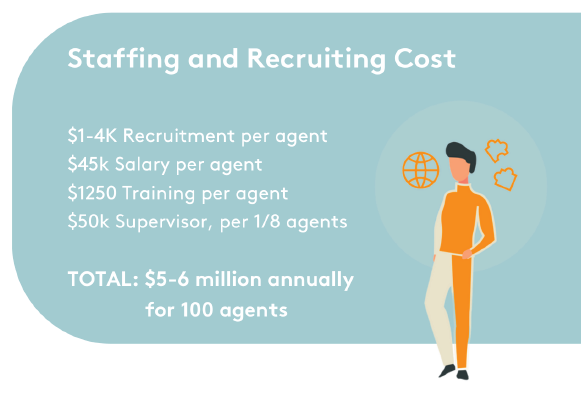
Agent Retention
Once you find the right person, retaining them becomes the next challenge. A recent call center survey identified the average turnover rate as a whopping 42%. That’s nearly three times the national average in other industries. This means ensuring a company culture that acknowledges the complexities of the role but also rewards it is essential. The foundation of this culture is comprehensive training that gives agents the confidence to execute the function of their role while making meaningful connections with patients.
Training programs should focus on both the technical and interpersonal sides of the role. Ensuring agents are adept at utilizing the necessary technology as well as being intimately familiar with the unique system guidelines and protocols is essential to operational performance— but it impacts the patient experience as well. Agents fumbling with the technical side of the job are likely to be distracted and incapable of the kind of active listening required to fully engage with patients. Beyond the logistics of the role, agents will require training specifically designed to help them identify any escalating safety issues. These skills can be easily incorporated into broader training that focuses on the soft skills that help extend the values of care culture over the phone, like listening for tonality and issuing appropriate empathy responses.
Healthcare Agent Training Tip: Don’t focus on handling times!
Average Handling Time (AHT) is a common call center performance metric but using this metric to gauge agent performance in healthcare is tricky. The role of a patient access representative is more nuanced than agents in other industries; they address a variety of differing caller needs, workflows are complex, and patients expect a high degree of personalization, customer service, and interactions that mirror care culture. In this case, short handling times may be problematic, indicating issues with customer service levels or call resolution. When training access agents it’s best to focus on being thorough, addressing all the patient’s needs, and engaging deeply with the patient to ensure an authentic connection. Positive patient experiences will deliver far better results in the long run than any short-term operational gains from quick call turnaround times.
With a strong foundation, the next critical aspect of a successful healthcare call center culture is creating a supportive environment for agents. A work environment that helps keep people satisfied and more engaged with the work they do impacts agent satisfaction as well as performance. Supportive work environments have good two-way communication, practice inclusivity that makes agents feel like they are part of a team, and project the same kind of warmth you want agents to extend to patients.
This does not have to be a physical environment. The same supportive workplace can be created through advanced communication and collaboration tools that emphasize team connections. Additionally, you can provide agents with opportunities to offer feedback through employee polls, a culture and communications committee, and ongoing focus groups. In fact, a virtual call center has a myriad of advantages, from being able to select from a nationwide talent pool and cover different time zones or extended hours with ease, to the ability to offer flexible work hours— flexible schedules and remote work opportunities can help attract agents.

And finally, a crucial mechanism for ensuring agent retention is a good incentive program. Incentive programs in a call center environment have been proven to motivate better performance, raise morale, and lower absenteeism. It’s important to develop an incentive program that takes the unique needs of an access role into consideration, focusing on the quality of the interactions and metrics that are reflective of the patient experience. Patient surveys can be excellent tools for gauging exemplary agent performance.
Happy Agents, Happy Patients
The idea that happy employees make happy customers is not just a theory. Research has shown that companies with employees in the top quartile of employee satisfaction and engagement outperform bottom quartile companies by 10 percent. The reason is simple: Satisfied employees are more motivated to perform well and understand they are a key component in the success of their organizations. Employee satisfaction is particularly critical in a healthcare call center environment considering the high turnover rate and expensive recruiting and onboarding processes, not to mention that poor performance can have a severely negative impact on access. While challenging, it is critical to maintain a high rate of agent engagement which is why selecting people with predispositions for success in the role and maintaining a supportive internal culture is so important.
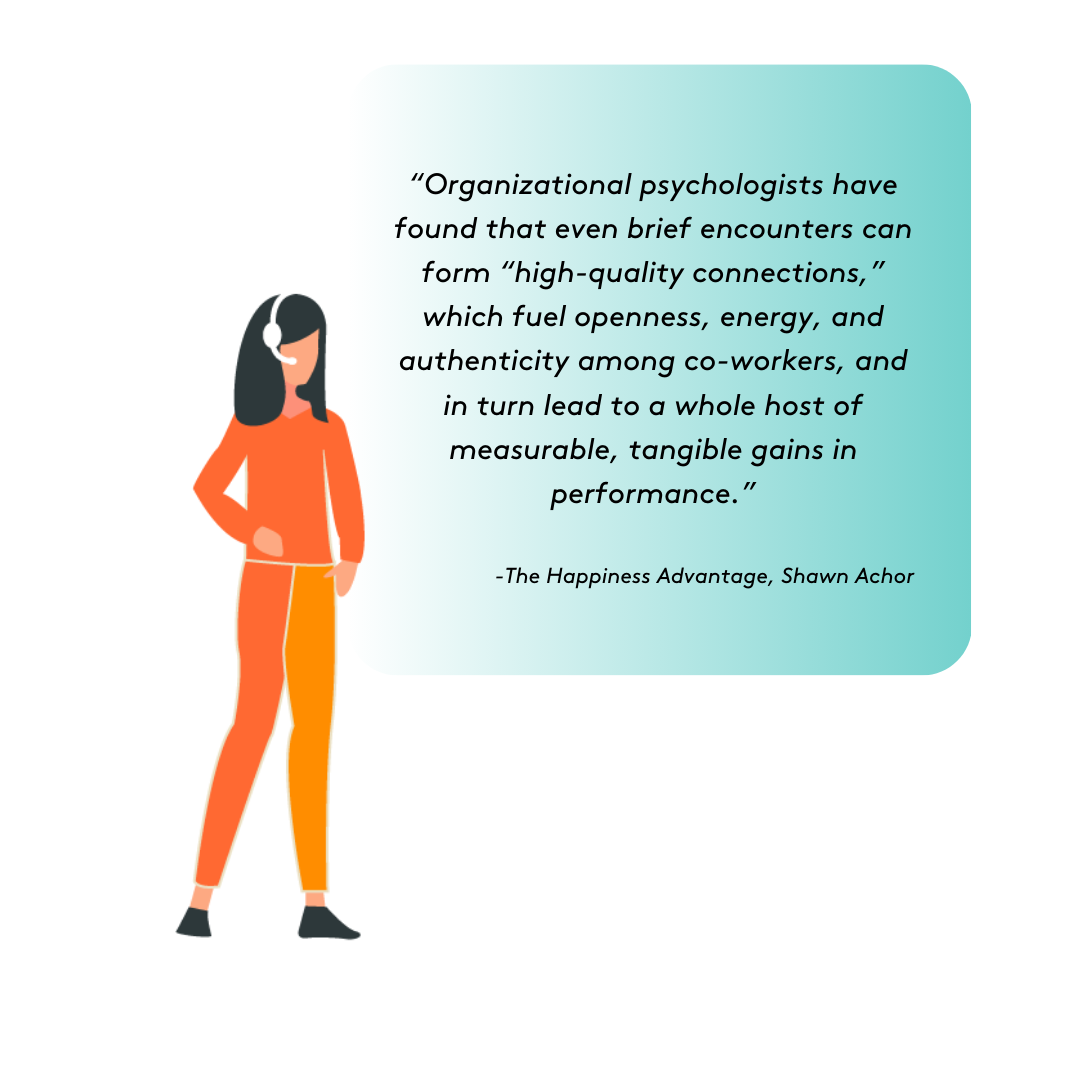
Conclusion
Recognizing the demand for improved experiences from today's consumers and the competitive landscape posed by industry disruptors, healthcare providers must embrace the human touch. Through genuine patient connections, building trust, and delivering personalized and convenient experiences, providers can set themselves apart. By meeting and exceeding patient expectations, providers can establish a distinct identity, reinforcing their commitment to authentic care and ensuring patient satisfaction.
The impact of the access experience on the patient journey cannot be understated.
By prioritizing care culture in call centers, providers can create an environment where patient needs are met, trust is fostered, and personalized care is delivered. With happy and well-suited agents, call centers can make a positive difference in patient communities, supporting clinical staff in their mission to establish lasting relationships and enhance patient outcomes. By doing so, healthcare organizations can stay ahead of industry disruptors, maintain a strong marketplace reputation, and foster the growth necessary to thrive in an everchanging healthcare consumer climate.
Sources:
1. Achor, S. (2011). The happiness advantage. Random House.
2. Bahadur, W., Aziz, S., & Zulfiqar, S. (2018, July 10). Full article: Effect of employee empathy on customer satisfaction and ... Taylor & Francis Online. https://www.tandfonline.com/doi/full/10.1080/23311975.2018.1491780
3. Baxter, A. (2022, November 29). Majority of Americans report negative healthcare experiences. Health Exec. https://healthexec.com/topics/patient-care/care-delivery/majority-americans-report-negative-healthcare-experiences
4. Brown, J. (2020, May 15). Skills that every medical call center agent should have - professional healthcare tips. Skills That Every Medical Call Center Agent Should Have - Professional Healthcare Tips. https://www.abetteranswer.com/blog/important-skills-that-every-medical-call-center-agent-should-have
5. Courtney E. Ackerman, MA. (2023, April 24). What is self-transcendence? definition and 6 examples (+PDF). PositivePsychology.com. https://positivepsychology.com/self-transcendence/
6. Derksen, F., Bensing, J., & Lagro-Janssen, A. (2013, January). Effectiveness of empathy in general practice: A systematic review. The British journal of general practice : the journal of the Royal College of General Practitioners. https://www.ncbi.nlm.nih.gov/pmc/articles/PMC3529296/#:~:text=There%20is%20a%20good%20correlation,delivers%20significantly%20better%20clinical%20outcomes.
7. EHS Today. (2001, October 9). Do incentives work? landmark study unveiled | EHS Today. EHS Today. https://www.ehstoday.com/archive/article/21910336/do-incentives-work-landmark-study-unveiled
8. Gallup. (2023, April 5). The benefits of employee engagement. Gallup.com. https://www.gallup.com/workplace/236927/employee-engagement-drives-growth.aspx
9. Gartner Inc. (2019, November). What’s your customer effort score? Gartner. https://www.gartner.com/smarterwithgartner/unveiling-the-new-and-improved-customer-effort-score
10. Guidi, C., & Traversa, C. (2021, July 1). Empathy in patient care: From “clinical empathy” to “empathic concern” - medicine, health care and philosophy. SpringerLink. https://link.springer.com/article/10.1007/s11019-021-10033-4
11. Haaland, M. (2021, September 6). Americans are afraid to go to the doctor, study finds. digitalhub US. https://swnsdigital.com/us/2018/10/americans-are-afraid-to-go-to-the-doctor-study-finds/
12. Jones. (2017). Prioritizing the patient experience download. Prioritizing the Patient Experience Download. https://www.jonespr.net/prioritizing-the-patient-experience
13. Mangan, D. (2016, April 5). Most stressful part of doctor’s visit: The wait, says survey. CNBC. https://www.cnbc.com/2016/04/05/most-stressful-part-of-doctors-visit-the-wait-says-survey.html
14. McMillen, S. (2019, December 11). How to measure Contact Center Effectiveness: Start with calls per scheduled activity. How to Measure Contact Center Effectiveness: Start with Calls per Scheduled Activity - ECG Management Consultants. https://www.ecgmc.com/thought-leadership/blog/how-to-measure-contact-center-effectiveness-start-with-calls-per-scheduled-activity
15. Mercer, S. W., Higgins, M., Bikker, A. M., Fitzpatrick, B., McConnachie, A., Lloyd, S. M., Little, P., & Watt, G. C. M. (2016, March). General practitioners’ empathy and health outcomes: A prospective observational study of consultations in areas of high and low deprivation. Annals of family medicine. https://www.ncbi.nlm.nih.gov/pmc/articles/PMC4781514/
16. Merriam-Webster. (n.d.-a). Compassion definition & meaning. Merriam-Webster. https://www.merriam-webster.com/dictionary/compassion
17. Merriam-Webster. (n.d.-b). Empathy definition & meaning. Merriam-Webster. https://www.merriam-webster.com/dictionary/empathy
18. Moudatsou, M., Stavropoulou, A., Philalithis, A., & Koukouli, S. (2020, January 30). The role of empathy in health and Social Care Professionals. Healthcare (Basel, Switzerland). https://www.ncbi.nlm.nih.gov/pmc/articles/PMC7151200/
19. NICE. (2022, January). Attrition to Retention Global Survey. Global survey report: From attrition to retention. https://www.callcentrehelper.com/resource.php?id=1628
20. Practice Builders. (2021, September 3). Top 10 front desk training tips for medical offices. Healthcare Marketing Agency. https://www.practicebuilders.com/blog/top-10-front-desk-training-tips-for-medical-offices/
21. Rakel, D., Barrett, B., Zhang, Z., Hoeft, T., Chewning, B., Marchand, L., & Scheder, J. (2011, December). Perception of empathy in the therapeutic encounter: Effects on the common cold. Patient education and counseling. https://www.ncbi.nlm.nih.gov/pmc/articles/PMC3107395/
22. Reed, P. G. (2021, March 12). Self-transcendence: A salutogenic process for well-being. National Library of Medicine . https://www.ncbi.nlm.nih.gov/books/NBK585654/
23. Tai-Seale, M., McGuire, T. G., & Zhang, W. (2007, October). Time Allocation in Primary Care Office visits. Health services research. https://www.ncbi.nlm.nih.gov/pmc/articles/PMC2254573/#:~:text=Average%20length%20of%20visits%20was,part%20spoke%20was%2055%20seconds.
About Envera Health
Envera Health provides comprehensive engagement partnerships for healthcare organizations seeking to transform the patient experience and simplify the care deliver y process. Supported by a unique CRM-driven engagement center, we other a complete suite of patient engagement solutions custom-designed to improve operational efficiency and enable steady growth.
